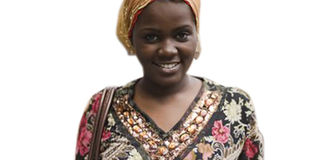Out to do her bit to better society

What you need to know:
She seems like a woman just doing her job, but what seems to direct her is the need to be positioned where she can improve matters, writes Abdulaziizi K. Tumusiime.
Talking to Latifah Kiribedda is like reading from a self-help book; she will leave you motivated. The conversation is peppered with sentences like “it is in your mind”, “it is hard work”, “if they can do it, we too can”. The beauty of being on the receiving end of her talk is that she has walked the talk - thus making it plausible.
After accepting to be interviewed, we agreed to meet at Javas, Kololo. The call ended with an appeal from her, “please keep time”. Unfortunately, I did not (traffic jam, eh!). When I arrived, 10 minutes after the agreed time, I expected to find her wearing a dismissive face. It was a smile instead. “I was utilizing these minutes to unwind,” she tells me, as we exchange pleasantries.
The 23-year-old looks young for the job she does. Kiribedda is a programme specialist with Usaid/SDS programme and a Global Health Corps fellow. Her job involves coordinating and supervising implementation of capacity building and programme support grants in Kasese, Kamwenge and Kyenjojo Districts as well as overseeing if the grants are effectively implemented by the local governments to improve social services.
Too young?
When I raise the issue of her age, she chuckles, and then informs me that she has learned over time to use it as an opportunity to prove her practical knowledge to the doubting Thomases. “In fact, I urge young people not to be afraid to pursue their dreams because of their age. After reading the requirements of a job, analyse yourself, if you have the skills, overlook your age and apply for it,” she remarks.
When Kiribedda chose to read Physics, Biology and Chemistry at A-level, like many a science student, she wanted to be a doctor. However, in her Senior Six vacation, she developed second thoughts. The Global Health Corps fellow participated in a leadership programme with Forum for Women in Democracy, a national women’s organisation. They visited a number of districts such as Gulu, where they distributed ARVs and mosquito nets. During the course of the programme, having seen the pitiful state of people’s health conditions, the idea of pursuing a degree in public health instead of medicine started trickling in. “I was asking myself questions like how do you save a population’s health rather than attending to one individual?” she recalls. When she left Gulu, she was convinced that her calling was in public health.
Pursuing a new dream
Enrolled at St. Catherine University, Minnesota to study the course she had suddenly developed passion for, she graduated among the top 10 in her class. This is a feat she proudly speaks of considering she was juggling academics with leadership. She was the students’ senate president at the university, the first African student to hold that post, as well as an active member of a number of student organisations such as the International Students’ Association, Women of Colour and the Muslim Students’ Association. “How did you manage to find time for all these responsibilities?” I ask. “It is all in the mind (self-help book, anyone?). If you like what you do, you cannot fail to find time for it. If your mind limits you, then rest assured that you will never maximize your potential,” she replies.
Kiribedda is the second born in a family of six. She grew up in Busega, a Kampala suburb. She went to Sir Apollo Kaggwa for her primary level education and Nabisunsa Girls’ for her secondary. After regaling me with her experience in high school, I realize that the enviable qualities she possesses, like the confidence she exudes and the assertiveness in her speech, did not come overnight. She was an acute member of a number of clubs such as the debate, music, and dance and drama. She says that these clubs greatly shaped her personality. Her first attempt at leadership was not at university level. The programme specialist is a former head girl of Nabisunsa Girls Secondary School.
Today, one of the projects she is involved in is called Saving Mothers Giving Life. It is a global health initiative whose goal is to reduce the maternal mortality in the districts of Kamwenge, Kyenjojo, Kabarole and Kibaale by 50 per cent.
“When I made up my mind to return home, I thought that I would come here and make things happen. My experience so far has been an eye opener. I have realised that the problem is bigger than say the high HIV prevalence rate, the problems we have are majorly systematic. Like hiring medical personnel, training them and challenges to do with corruption,” she notes. “Take the example of a nurse that I interacted with. This lady used to come late for work. Her reason was that she has to first attend to her vegetable garden because her modest salary that comes in late, cannot sustain her financial responsibilities.”
Kiribedda intends to go for higher education in order to be in a position to address these systematic challenges. That she harbours such good intentions for the country, you cannot help wishing her luck in her endeavours.




